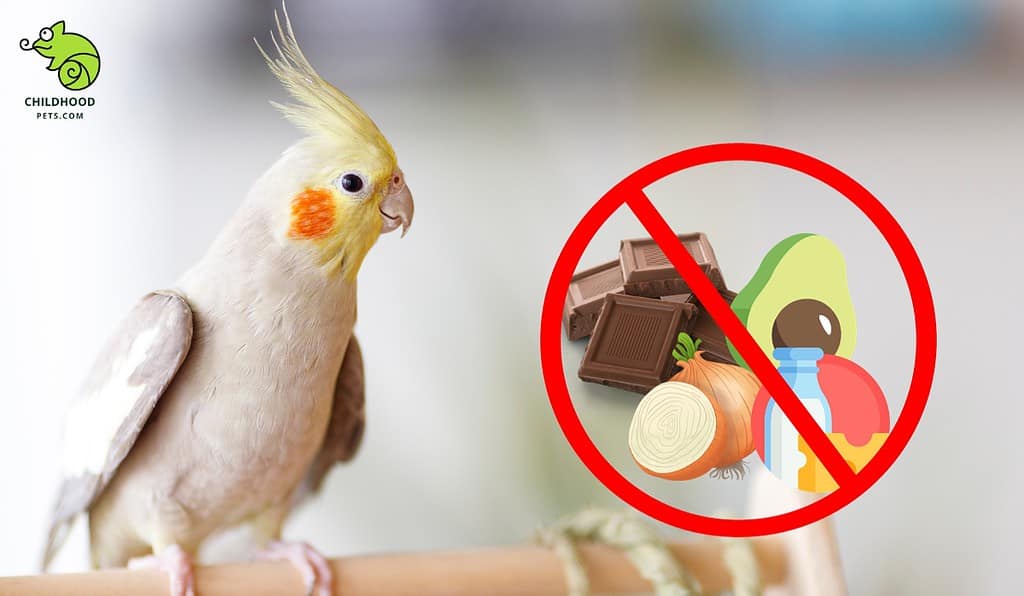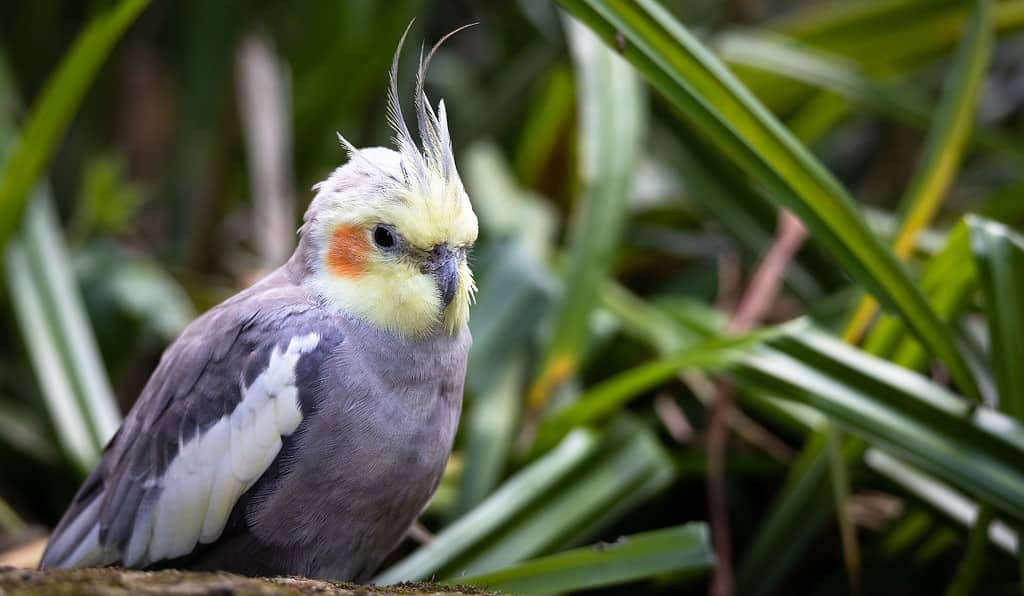
Imagine the joy of watching your cockatiel chirping and fluttering around, full of life and energy. This delightful scene is only possible when your feathered friend is in the pink of health, which is largely determined by their diet. What a cockatiel eats is crucial for its well-being, but do you know what foods are a strict no-no for them?
As a general rule, avoid feeding your cockatiel chocolate, avocado, onion, garlic, alcohol, and foods containing xylitol or high salt content. These can cause serious health issues or even prove fatal for your beloved pet bird.
Ready to ensure the safety and health of your cockatiel through the right diet? Dive into this comprehensive vet’s report on what a cockatiel cannot eat, and arm yourself with the knowledge to keep your pet bird happy, healthy, and away from harm’s way. Your cockatiel’s vibrant life depends on it!
What Not To Feed Cockatiels
Navigating the world of a cockatiel’s diet can be a bit of a maze. Let’s embark on this journey to explore the foods that should never find their way into a cockatiel’s diet.
1. Chocolate
Chocolate is a lethal food for cockatiels. It contains theobromine, a substance that can cause severe symptoms such as vomiting, diarrhea, rapid breathing, and heart arrhythmias. Ingesting even a small amount can lead to theobromine poisoning, resulting in seizures, tremors, and, unfortunately, death. It’s crucial to keep all forms of chocolate, including baked goods and chocolate-covered items, out of your cockatiel’s reach.
2. Avocado
Avocado contains persin, a fungicidal toxin, which can cause significant health issues in cockatiels. Symptoms of avocado poisoning include difficulty breathing, lethargy, and the inability to perch. The high-fat content in avocados can also contribute to obesity and related health issues in cockatiels. It’s best to avoid feeding avocado in any form to your cockatiel to ensure their long-term health and well-being.
3. Onions and Garlic
Onions and garlic, despite their culinary uses, are harmful to cockatiels. They contain sulfur, which can cause irritation in the mouth lining, induce ulcers, and lead to anemia in cockatiels.
- Sulfur compounds in onions and garlic are ingested by the bird.
- These compounds cause irritation in the mouth lining, crops, or esophagus.
- Continuous ingestion can lead to the rupture of red blood cells, causing anemia.
4. Mushrooms
Certain types of mushrooms, especially wild or unidentified ones, are toxic to cockatiels. For instance, Amanita and false morel mushrooms can cause severe health complications. Symptoms of mushroom poisoning can include digestive upset, liver failure, and neurological issues. It’s safest to avoid feeding any mushrooms to cockatiels to prevent potential toxicity.
5. Caffeinated Drinks
Caffeinated beverages, including coffee, tea, and soda, are harmful to cockatiels. Caffeine can cause increased heart rate, hyperactivity, and excessive thirst in birds. In severe cases, it can lead to cardiac arrest. It’s essential to ensure your cockatiel does not have access to any caffeinated beverages to maintain their optimal health.
6. Dairy Products
Cockatiels, like all birds, are lactose intolerant. Feeding them dairy products can cause diarrhea and other digestive issues.
- Milk
- Cheese
- Yogurt
In the journey of caring for your cockatiel, ensuring they avoid these toxic foods is paramount. Always consult your veterinarian for comprehensive dietary guidance to keep your feathered companion chirping happily for years to come.
7. Fruits Pits and Apple Seeds
Beware of the hidden dangers in fruit pits and apple seeds. They contain cyanide, a toxic compound that can cause serious health issues in cockatiels.
Table: Common Fruits and Their Seeds/Pits
| Fruit | Seeds/Pits | Harmful to Cockatiels |
| Apple | Yes | Yes |
| Cherry | Yes | Yes |
| Peach | Yes | Yes |
| Plum | Yes | Yes |
| Pear | Yes | No |
8. Xylitol
Xylitol, a sugar substitute found in many sugar-free products, is another hidden danger to cockatiels.
Common Household Products Containing Xylitol:
- Sugar-free gum
- Sugar-free baked goods
- Certain peanut butters
- Sugar-free candies
- Mouthwash and toothpaste
9. Salty Foods
High salt content in foods can be detrimental to cockatiels. Excessive salt intake can lead to salt toxicity, manifesting as increased thirst, urination, and symptoms of kidney dysfunction. Foods high in salt, such as chips, salted nuts, and processed foods, should be avoided to ensure your cockatiel’s dietary health and overall well-being.
10. Alcohol
Alcohol is extremely harmful to cockatiels, causing a range of serious health issues. It can damage the liver and nervous system, leading to symptoms like disorientation, drowsiness, and changes in behavior. Ingesting even a small amount of alcohol can be fatal for cockatiels. It’s imperative to keep alcoholic beverages and foods containing alcohol far away from your feathered friend.
What to Do If a Cockatiel Eats Toxic Foods

If your cockatiel ingests toxic foods, immediate action is crucial.
Steps to Take If a Cockatiel Ingests Toxic Foods:
- Remove any remaining toxic food from the cockatiel’s reach.
- Provide fresh water to the bird.
- Contact a veterinarian immediately.
- Keep the bird warm and quiet.
Best Foods for Cockatiels
On a brighter note, there are numerous safe and nutritious foods for cockatiels.
Best Foods for Cockatiels:
- Leafy greens
- Cooked grains
- Fresh fruits (without pits or seeds)
- Pelleted cockatiel food
- Fresh vegetables
Frequently Asked Questions
What can hurt a cockatiel?
A variety of foods can harm a cockatiel, including chocolate, avocado, and onions, which contain substances toxic to these birds. Other dangerous items include alcohol, xylitol, and excessive salt, leading to severe health complications or even death.
Do cockatiels eat rice?
Yes, cockatiels can safely eat cooked rice. It provides them with essential nutrients and can be a healthy addition to their diet. Ensure the rice is plain, without any added salt, spices, or sauce.
Can cockatiels eat cooked potatoes?
Cockatiels can eat cooked potatoes in moderation. Ensure they are thoroughly cooked, mashed, and served plain, without any added butter, salt, or spices.
Conclusion
In closing, the diet you provide for your cockatiel plays a pivotal role in their health and happiness. Steer clear of the harmful foods listed above and always consult a vet if you’re unsure about a certain food item. Your feathered friend is counting on you to make the best dietary choices for them. Share this vital information with fellow cockatiel enthusiasts and let’s keep our birds chirping happily and healthily. Your thoughts are welcome in the comments below. Your sharing is caring for our feathered friends!
